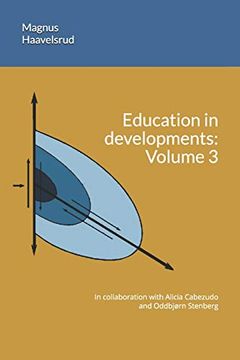Compartir
Education in Developments: Volume 3 (en Inglés)
Magnus Haavelsrud (Autor)
·
Arena
· Tapa Blanda
Education in Developments: Volume 3 (en Inglés) - Magnus Haavelsrud
$ 13.41
$ 16.99
Ahorras: $ 3.58
Elige la lista en la que quieres agregar tu producto o crea una nueva lista
✓ Producto agregado correctamente a la lista de deseos.
Ir a Mis ListasSe enviará desde nuestra bodega entre el
Lunes 20 de Mayo y el
Martes 21 de Mayo.
Lo recibirás en cualquier lugar de Estados Unidos entre 1 y 3 días hábiles luego del envío.
Reseña del libro "Education in Developments: Volume 3 (en Inglés)"
In this peace education book - “developments” in its plural form – is inspired by the Swedish social scientist Gunnar Myrdal when he – in criticizing dominant thought in economics in the 60ies - described development as an upward movement of qualities of value in a society and in the world. This book considers peace as a value. According to Johan Galtung`s recent theory, peace is built through upward movements of equity and empathy as well as processes of healing of past and present traumas combined with nonviolent conflict transformation. These peace qualities can be investigated in all places and times ranging from everyday life to the global level. It is argued that educational energy from below and political energy from above tend to seek harmony – even in contexts of strong antagonism between cultures and structures. This dynamism can be reflected in criticism of and struggles against problematic contextual conditions as well as in constructive ideas and plans for how those conditions can be changed. The cultural voice of education is therefore of political relevance pointing towards the need for transformation of problematic – sometimes violent – contextual conditions. In case such circumstances prevail, pedagogic activity may respond by adapting to the status quo – or resist. If such resistance is not possible within formal education, it is always possible (to varying degrees of difficulty and danger) in informal and/or non-formal education. In Part 1 it is argued that education in developments towards more peace is a topic of transdisciplinary magnitude. It comprises contents ranging from dyadic relations (and even inner peace) to the overwhelming structures on the global level. Micro cultural qualities meet qualities in global structures and their relations are decisive in the creation of more peace developments - involving actors from individuals to nation states and global corporations as well as organizations at any level/time. Chapters 1 through 3 introduce theoretical perspectives on education in developments towards peace in which the complexities of its substance not only pose the question of what is to be regarded as valid content, but also how contents relate to varying communication forms and differing contextual conditions. Dialectical relations among contents, forms and contextual conditions are central in transdisciplinary methodologies - embryonic roots of which are found in peace education initiatives as exemplified in the struggle against South African apartheid, Borrelli´s social work among street children in Naples and Nomura´s lifelong integrated education originating in Japan (chapter 4).In Part 2 it is argued that the understanding of relations between micro and macro requires respect for multiple epistemologies rooted in peoples´ life worlds when seeking their participation in developments towards more peace. Life worlds portrayed in novels written by young South African authors serve as examples of how people relate to each other in the transformation from apartheid to democracy (chapters 5 and 6). Chapter 7 highlights the roots of present constitutive rules inherited from past empires and chapter 8 discusses how social science is still characterized by multi-paradigmatic tensions in its understanding of power and knowledge.Part 3 deals with educational policy and methodologies. Chapter 9 presents an educational policy-making framework for participation, democracy and nonviolent civic resistance in Latin American circumstances. Chapter 10 discusses issues of transnational and neoliberalist policymaking in education furthered by OECD and the last chapter revisits peace learning methodology in light of Johan Galtung`s theory of peace.
- 0% (0)
- 0% (0)
- 0% (0)
- 0% (0)
- 0% (0)
Todos los libros de nuestro catálogo son Originales.
El libro está escrito en Inglés.
La encuadernación de esta edición es Tapa Blanda.
✓ Producto agregado correctamente al carro, Ir a Pagar.

